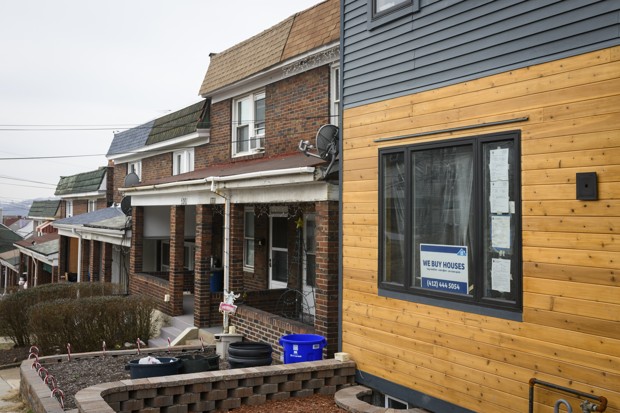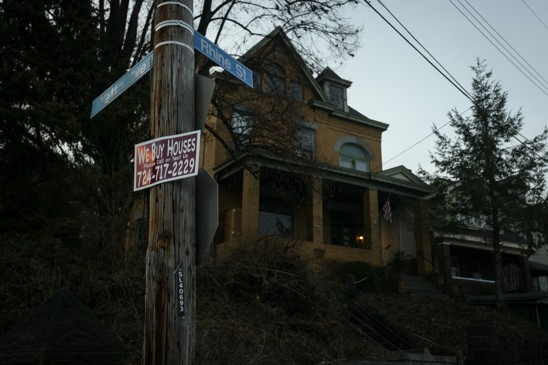
As the city’s real estate market heats up, neighborhood groups say that cash investors use building code violations to encourage homeowners to sell.
Every week, Sandra Hazley gets one or two mailers offering to buy her house. Sitting on her back porch, Hazley, 74, pulls out a handful of the laminated cards. They all make the same offer: Investors are angling to snap up a two-bedroom home she owns and rents out on Pittsburgh’s North Side, quickly, with cash, as is.
The cash investors have also found her phone number. “A girl called me on my cell phone,” Hazley recounted. “She kept saying, ‘It could be turned into a really nice house.’ I kept on saying, ‘It’s not for sale.’”
It’s a sign of the times in Pittsburgh, where an influx of tech jobs is helping to push home prices in some neighborhoods to double or triple what they were ten years ago. As the real estate market heats up, wholesalers, house flippers, and other short-term investors are fishing for properties. The Steel City has one of the highest flip rates in the U.S., according to ATTOM Data Solutions. (A “flip” is two sales of a house within a year.)
The assessed value of Hazley’s North Side house has quadrupled since she bought it for $11,000 in 1998, but she isn’t selling. After retiring from a manufacturing firm, she had a stint as a real estate investor—buying, renting, and selling houses. She left that business, but held onto the North Side house, renting it to a couple who live on Social Security Disability Insurance. “They are nice people and they pay their rent,” Hazley said, “and I don’t care as long as I can pay the [property] taxes.”
Last November, Hazley found something else about her rental house in her mailbox—a notice of a building code violation from the city’s Department of Permits, Licenses and Inspections, ordering her to scrape loose paint from the exterior. Hazley hired contractors to sandblast the paint from the house, but notices from DPLI kept coming, none of which acknowledged the work done on the house. The last set a court date with a district magistrate. It took a series of frustrated phone calls for Hazley to close the case.
Complainants to DPLI are kept anonymous, but Hazley thinks she knows who might have reported her: a cash-for-home investor. “They’ll do anything for an in,” said Hazley. “They’re like predators.”

In Pittsburgh, almost all code inspections of residential properties are instigated by a complaint. So when homeowners in prime neighborhoods receive building code citations amid a flood of offers, many suspect that cash buyers—an unlicensed and largely unregulated segment of the real estate ecosystem known for their persistence and knowledge of building codes—are behind it. Community groups are also convinced that the flippers have essentially weaponized tip lines like the city’s 311 nonemergency service, trying to create a hassle that will incentivize homeowners to sell. “This is something I’ve heard of and we have confirmed reports of it,” said Dave Breingan, executive director of Lawrenceville United, a nonprofit community group that advocates for area residents.
Pittsburgh’s most dramatically gentrified neighborhood, Lawrenceville has transformed from a slope of working-class rowhouses to an artists’ haven for cheap rent to a sea of new condos and hip restaurants. The average home price boomed from $71,000 to $219,000 in ten years, according to Zillow. Now century-old houses are being demolished for new builds advertised for as much as $740,000. Longtime homeowners report getting pelted with cash offers.

Breingan has also noticed an uptick in residents coming to Lawrenceville United holding code violation letters. (The nonprofit provides resources for fixes.) “We know there are predatory cash offers on people’s homes,” he said. “It’s taking advantage of the system.”
Violations from tipsters are baffling and enraging to residents. Hazel Store, for example, received a violation notice last year about chipped paint and a twisted piece of wood in a door frame in the Lawrenceville home she inherited from her mother. Store’s sister, 73 and affected by cataracts and arthritis, lives there. She doesn’t think a neighbor was behind the complaint; several of them collaborated to remove a sloping tree affecting the block last year.
Jim O’Brien replaced his doors and window frames and fixed chipped paint in response to a violation notice for his home, which he purchased in 1976. “It was someone who wanted to do some buying, so they called the city,” O’Brien said.
Kyle Webster, an attorney who works as a general counsel for an affordable housing developer, also does pro bono work for his neighbors in Lawrenceville, helping them deal with renovation issues and navigate home sales. One elderly resident came to him with a code violation notice of small infractions. Webster got enough paperwork to trace it to a developer implementing construction on his block. The developer asked to survey the man’s property for building purposes, made an offer on the home, and then lodged an anonymous complaint through the city’s 311 line, said Webster. The attorney said he found the contractor’s phone number on paperwork relating to the complaint.
“For other ones, I have suspicions,” said Webster. “I get cash offers weekly. It’s part of living in Lawrenceville, and so is bullying through [D]PLI.”
Maura Kennedy, director of the Department of Permits, Licenses and Inspections, said that about 99 percent of residential inspections originate through the 311 line. Inspectors don’t know, in most cases, who originated the call, or why—nor should that matter. “The inspector should not be making a value judgment on the caller,” Kennedy said. “[O]ur situation is balls and strikes. We apply one standard consistently and the code is for everyone.”

For flippers on the prowl for deals, seeking an edge via 311 complaints is just a part of the game. These investors are hunting for homeowners incentivized to sell quickly, and they want to find them before they’ve listed their homes. Public information can provide a bevy of clues. Some flippers scour code violations, liens, divorces, evictions, and foreclosures for properties that seem to be a pain to their owners. Permits for additions and renovations can also be a sign a homeowner is getting ready to sell. The forums on the investor website Bigger Pockets are full of tips for getting this information. Some posters even sell citywide data.
“These can be a good source of locating potentially motivated sellers,” wrote a poster trying to sell a listing of housing code violations in Philadelphia. “Many are also absentee owners, faced with tenants creating issues with their properties.” In another post, a newbie cash investor asks what to do with the list of code violations he wrangled from the city government of Phoenix. “Keep mailing,” recommends one respondent. “It is more important to keep mailing to the same recipient rather than mail to a lot of prospects.”
Once a cash buyer secures a home, they usually fix it up enough to flip it for a profit—though in truly hot neighborhoods they don’t always need to. Jim Roudeski, owner of the frequent mailer sender IBuyPittsburgh, said if he got a bite in a neighborhood like Lawrenceville, a larger investment firm would buy the contract immediately.
Roudeski does most of his own flipping in a low-rent suburb immediately outside city limits. “Everyone has their niche,” he said. He doesn’t use public data from inspections (or any other sources of sad stories), but targets his efforts more geographically.
The image of house-flippers has been sullied, he says, because people only see the offers made for deteriorated old homes and the prices when they go into the market, but none of the costs of repairing them. “Everyone seems to think we’re getting rich off this,” Roudeski said, “but my margins are pretty thin.”
He is skeptical that investors would call DPLI on a prospective lead. “It sounds like neighbors,” he said.
Neighborhood advocates aren’t so sure: Some think flippers have gone beyond searching for incentives and instigated a few.

Rick Schwartz is executive director of the Bloomfield-Garfield Development Corporation, which works to improve the two neighborhoods that abut Lawrenceville. Bloomfield and Garfield went through a redevelopment and home price spike similar to Lawrenceville’s. He calls the surge in violation notices an “unanticipated downside” of improved public access to information like building permit applications, code violations, and court proceedings involving housing.
“It invites unscrupulous folks, like home wholesalers, to use the information to apply the screws to unsuspecting property owners,” Schwartz said. “The 311 system, unfortunately, isn’t able to detect when the motivation of the caller isn’t completely above board. Maybe it’s time that DPLI inspectors are told who authored the complaint in the first place.”
Karen Thompson, a retiree, has lived most of her life in a five-bedroom home on a hillside in Garfield. Her parents bought it in 1964. “When my mom passed, I bought [shares of] it from my brothers and sisters,” Thompson said, sitting in one of the typically chic coffee shops that have sprouted in Garfield. “It became where you stayed when you were passing through.”
In 2016, Thompson hired a contractor to install a parking pad and ramp. “I was trying to make my house more senior citizen-ready,” she said, “because I’m getting to be a senior citizen.”
Last April, she received a notice from DPLI about a lack of an occupancy permit for the renovation. She thought the contractor filed the proper paperwork with the city, but he had not.
The inspector said a complainant “went through 311 and that’s how they tracked it,” said Thompson. “It felt suspicious.”
The ramp and pad had sat unnoticed for three years; she’s convinced that her neighbors would not narc on each other over building codes—but if even one would, how would they have known that she lacked a permit? She didn’t even know.
However, a cash investor with sophisticated knowledge of public information, searching for building permits, might notice that a new-looking addition in their target area lacked one.
It’s not a coincidence, she said, that Garfield is in the midst of a mailer onslaught from house flippers: “They’re everywhere,” said Thompson. “That’s when these letters amount to harassment.”
Thompson said she hears frequently about code enforcement activity. “I’m hearing of citations being issued. ‘Your trees are overgrown; your trees are too high.’ Someone is getting to them.”
During an interview in a neighborhood coffee shop, Thompson spread out a file of paperwork from the city on the table: violation notices and follow-ups from the inspector. Punk rock played as 20- and 30-somethings stared into laptops. She reached for a private criminal complaint the inspector had lodged against her, with a court date she avoided, by paying about $700 in fees to the city and lawyer costs.
“A lot of folks want to move into this area because it is a nice place to live,” Thompson said. “To force someone out is, for no better word, mean.”
"tactic" - Google News
January 25, 2020 at 01:24AM
https://ift.tt/3aFqgt9
How Pittsburgh's House Flippers Get Buyers to Sell - CityLab
"tactic" - Google News
https://ift.tt/2NLbO9d
Shoes Man Tutorial
Pos News Update
Meme Update
Korean Entertainment News
Japan News Update
Bagikan Berita Ini














0 Response to "How Pittsburgh's House Flippers Get Buyers to Sell - CityLab"
Post a Comment